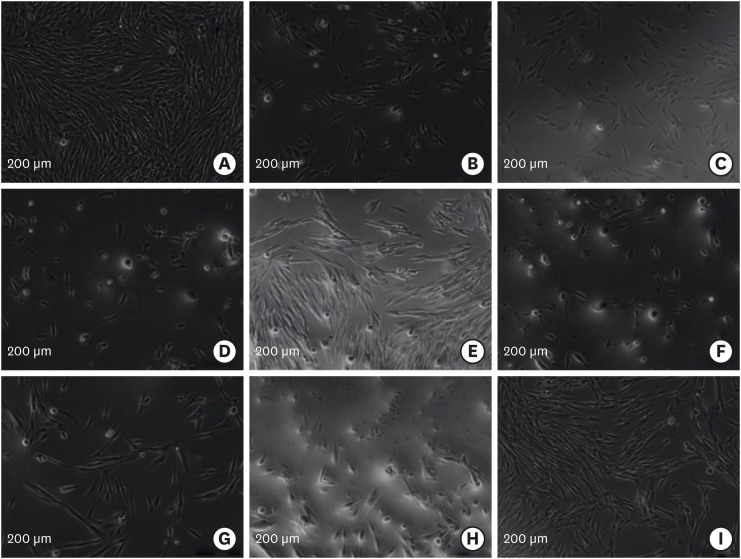Search
- Page Path
- HOME > Search
- Effects of four novel root-end filling materials on the viability of periodontal ligament fibroblasts
- Makbule Bilge Akbulut, Pembegul Uyar Arpaci, Ayce Unverdi Eldeniz
- Restor Dent Endod 2018;43(3):e24. Published online May 25, 2018
- DOI: https://doi.org/10.5395/rde.2018.43.e24

-
 Abstract
Abstract
 PDF
PDF PubReader
PubReader ePub
ePub Objectives The aim of this
in vitro study was to evaluate the biocompatibility of newly proposed root-end filling materials, Biodentine, Micro-Mega mineral trioxide aggregate (MM-MTA), polymethylmethacrylate (PMMA) bone cement, and Smart Dentin Replacement (SDR), in comparison with contemporary root-end filling materials, intermediate restorative material (IRM), Dyract compomer, ProRoot MTA (PMTA), and Vitrebond, using human periodontal ligament (hPDL) fibroblasts.Materials and Methods Ten discs from each material were fabricated in sterile Teflon molds and 24-hour eluates were obtained from each root-end filling material in cell culture media after 1- or 3-day setting. hPDL fibroblasts were plated at a density of 5 × 103/well, and were incubated for 24 hours with 1:1, 1:2, 1:4, and 1:8 dilutions of eluates. Cell viability was evaluated by XTT assay. Data was statistically analysed. Apoptotic/necrotic activity of PDL cells exposed to material eluates was established by flow cytometry.
Results The Vitrebond and IRM were significantly more cytotoxic than the other root-end filling materials (
p < 0.05). Those cells exposed to the Biodentine and Dyract compomer eluates showed the highest survival rates (p < 0.05), while the PMTA, MM-MTA, SDR, and PMMA groups exhibited similar cell viabilities. Three-day samples were more cytotoxic than 1-day samples (p < 0.05). Eluates from the cements at 1:1 dilution were significantly more cytotoxic (p < 0.05). Vitrebond induced cell necrosis as indicated by flow cytometry.Conclusions This
in vitro study demonstrated that Biodentine and Compomer were more biocompatible than the other root-end filling materials. Vitrebond eluate caused necrotic cell death.-
Citations
Citations to this article as recorded by- Effects of Three Retrograde Filling Materials on Production of Inflammatory Cytokines and Resorbing Mediators
Samaneh Arab, Marjan Bahraminasab, Masoumeh Motamedi, Jamshid Hadjati, Alaviye Vahid
Journal of Microbiota.2024;[Epub] CrossRef - Apoptotic effects of biodentine, calcium-enriched mixture (CEM) cement, ferric sulfate, and mineral trioxide aggregate (MTA) on human mesenchymal stem cells isolated from the human pulp of exfoliated deciduous teeth
Bahareh NAZEMI SALMAN, Mahshid MOHEBBI RAD, Ehsan SABURI
Minerva Dental and Oral Science.2024;[Epub] CrossRef - Assessment of Mechanical/Chemical Properties and Cytotoxicity of Resin-Modified Glass Ionomer Cements Containing Sr/F-Bioactive Glass Nanoparticles and Methacrylate Functionalized Polyacids
Wisitsin Potiprapanpong, Parichart Naruphontjirakul, Chutikarn Khamsuk, Somruethai Channasanon, Arnit Toneluck, Siriporn Tanodekaew, Naruporn Monmaturapoj, Anne M. Young, Piyaphong Panpisut
International Journal of Molecular Sciences.2023; 24(12): 10231. CrossRef - Comparative biological properties of resin-free and resin-based calcium silicate-based endodontic repair materials on human periodontal ligament stem cells
Shehabeldin M. Saber, Shaimaa M. Gomaa, Mohamed M. Elashiry, Ahmed El-Banna, Edgar Schäfer
Clinical Oral Investigations.2023; 27(11): 6757. CrossRef - Comparison of root end sealing ability of three retrograde filling materials in teeth with root apices resected at 900 using dye penetration method under fluorescent microscope
Dr. Payal Chaudhari, Manoj Chandak, Dr. Aditya Patel
F1000Research.2023; 12: 1049. CrossRef - The Effects of Tricalcium-Silicate-Nanoparticle-Containing Cement: In Vitro and In Vivo Studies
Naho Ezawa, Yoshihiko Akashi, Kei Nakajima, Katsutoshi Kokubun, Masahiro Furusawa, Kenichi Matsuzaka
Materials.2023; 16(12): 4451. CrossRef - Evaluation of the cytotoxic effects of a new Harvard MTA compared to MTA Flow and ProRoot MTA on human gingival fibroblasts
Abdel-Rahman Youssef, Samia Elsherief
The Saudi Dental Journal.2021; 33(7): 679. CrossRef - Cytotoxicity and Bioactivity of Mineral Trioxide Aggregate and Bioactive Endodontic Type Cements: A Systematic Review
Uma Dixit, Rucha Shivajirao Bhise Patil, Rupanshi Parekh
International Journal of Clinical Pediatric Dentistry.2021; 14(1): 30. CrossRef - MTT versus other cell viability assays to evaluate the biocompatibility of root canal filling materials: a systematic review
A. V. B. Pintor, L. D. Queiroz, R. Barcelos, L. S. G. Primo, L. C. Maia, G. G. Alves
International Endodontic Journal.2020; 53(10): 1348. CrossRef - Micro-computed tomographic evaluation of the flow and filling ability of endodontic materials using different test models
Fernanda Ferrari Esteves Torres, Juliane Maria Guerreiro-Tanomaru, Gisselle Moraima Chavez-Andrade, Jader Camilo Pinto, Fábio Luiz Camargo Villela Berbert, Mario Tanomaru-Filho
Restorative Dentistry & Endodontics.2020;[Epub] CrossRef - Long-term Follow-up for Apical Microsurgery of Teeth with Core and Post Restorations
Astrid Truschnegg, Petra Rugani, Barbara Kirnbauer, Lumnije Kqiku, Norbert Jakse, Robert Kirmeier
Journal of Endodontics.2020; 46(2): 178. CrossRef - Comparison of Cytotoxic Effects of Calcium Silicate-based Materials on Human Pulp Fibroblasts
Mehmet Adıgüzel, Fuat Ahmetoğlu, Ayçe Ünverdi Eldeniz, Mehmet Gökhan Tekin, Bülent Göğebakan
Journal of Dental Research, Dental Clinics, Dental Prospects.2019; 13(4): 241. CrossRef
- Effects of Three Retrograde Filling Materials on Production of Inflammatory Cytokines and Resorbing Mediators
- 1,759 View
- 5 Download
- 12 Crossref


 KACD
KACD

 First
First Prev
Prev


